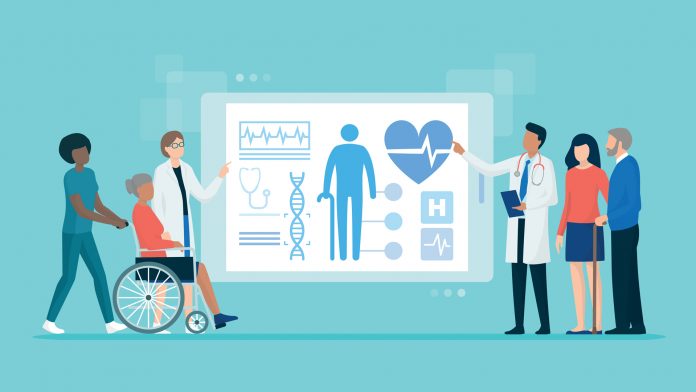The Innovation Platform speaks to ABHI Communications Manager Jonathan Evans about the advantages of AI and machine learning in the healthcare sector.
Representing the health technology industry in the UK is the Association of British HealthTech Industries (ABHI). Their role as a membership body is to support this community to save and enhance lives. With 300 members, including both multinationals and small and medium enterprises (SMEs), their companies provide a broad range of products into the healthcare system, from syringes and wound dressings, to surgical robots and digitally enhanced technologies.
ABHI works with stakeholders to demonstrate how HealthTech advances the efficiency and affordability of healthcare, through supporting the adoption of value based technologies. Their regulatory expertise help companies understand the landscape, and they work to create a positive environment that encourages growth through international trade and SME support.
What are some of the latest developments in health technology?
The health technology (HealthTech) sector is broad, diverse and ever-changing. From its engineering-based origins, it has evolved from being simply product based, to delivering value-based service solutions and increasingly incorporating new fields of science, utilising digital data, Artificial Intelligence (AI), nanomaterials and robotics. The industry is fundamental to modern healthcare, enabling clinicians to deliver improved patient outcomes and efficiency gains for the NHS.
Products are developed in an iterative process to meet the changing needs and challenges of the external environment. At present, ageing populations and an increase in chronic conditions have meant that health systems are struggling to provide the level of service they may once have been able to. As such, there is a need to innovate and look at alternative methods to support the delivery of healthcare. We must now predict, identify, diagnose and treat patients in a holistic manner and as early as possible to prevent, manage or halt disease progression.
There will always be a role for the hospital, but with the right use of technology, we can start to look at delivering care in alternative environments, such as the home or workplace. By using the increasing amount of data available and predictive algorithms, we are positioned to better manage health both at an individual and population level, with added focus on prevention and protection, thus, alleviating pressures on health systems. Programmes that equip services such as the NHS to deliver on what is arguably their biggest asset, its data, will be particularly important. As the world’s largest single health-payer system, the NHS has a rich data pool. Large datasets, utilised effectively, mean that care can become more predictable, personalised and precise.
What advantages can AI and machine learning offer the healthcare sector?
A critical challenge facing the NHS is its staffing shortage. The King’s Fund believe that the shortfall, currently at 100,000, could reach quarter of a million by end of the decade.1 What AI brings is the technology to give clinicians more capability with their time. This isn’t about replacing nurses and doctors, but augmenting them, giving them the tools to focus more on each patient interaction and complex cases.
Clinician burnout is a serious problem in the health sector, and AI has the ability to alleviate this. It can do what humans can, but in a fraction of the time, for example, scanning thousands of images to help diagnose issues. Something that would take the human eye significantly longer. In saving time, it can reduce errors and increase clinician capacity, therefore lowering the overall costs of administering health, which in itself is hugely beneficial to providing a sustainable, publicly funded health service.
What is the importance of the governance and regulation of AI solutions in healthcare, and what are some of the challenges that come alongside this?
As with any new areas of science, the integration of AI into healthcare will bring with it challenges and opportunities. In taking a health technology product to market, it must provide evidence that it delivers a benefit over the current standard of care and that its use outweighs any risk involved. This can be done through the collection of sufficient evidence, testing and clinical trials, as well as improving on what is already available to clinicians. For AI, however, systems will continue to learn and refine once they are actually in clinical use and collecting new data, thus presenting a unique challenge as to how they are regulated. Health is highly regulated, and rightly so. Patient consent must be the foundation of any work in this area. Therefore, we must establish a system that is based on trust and transparency, but also regulations that are flexible enough to keep up with the pace of change. Work on this important area has begun in earnest.
What role can standardisation play in the deployment of AI solutions in healthcare?
Enabling interoperability between datasets and technology is vital to the efficient operation of an effective digital service. The technology infrastructure should allow systems to interact securely, using open standards for data and interoperability. This requires open and transparent technology standards as well as clinical data standards that ensure the right data is collected accurately and consistently. Interoperable, connected health information has shown cost-and time-saving benefits and supports better care delivery.
References
Johnathan Evans
Communications Manager
Association of British HealthTech Industries
enquiries@abhi.org.uk
Tweet @UK_ABHI
www.abhi.org.uk/
Please note, this article will also appear in the first edition of our new quarterly publication.









